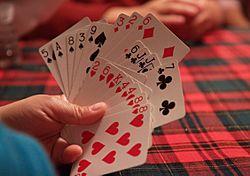Cheat (game) facts for kids
 |
|
| Alternative names | Bluff, B.S., I Doubt It |
|---|---|
| Type | Shedding-type |
| Players | 2–6 |
| Skills required | Counting, number sequencing |
| Age range | 8+ |
| Cards | 52 (104) |
| Deck | French |
| Play | Clockwise |
| Random chance | Medium |
| Related games | |
| Valepaska, Verish' Ne Verish', Poker Bull | |
| Easy to play | |
Cheat (also known as B.S., Bluff, or I Doubt It) is a fun card game where players try to get rid of all their cards. It's a game of cleverness and deception! You play cards face-down and can even lie about what cards you're playing. If someone thinks you're lying, they can challenge you by shouting "Cheat!" The person who loses the challenge has to pick up all the cards played so far. Cheat is a popular party game and is often taught by word of mouth, which is why it has so many different names.
Contents
How to Play Cheat
To play Cheat, you'll need a pack of 52 cards. If you have five or more players, it's best to combine two packs of 52 cards.
Setting Up the Game
First, shuffle all the cards well. Then, deal them out as evenly as possible to all the players. It's okay if some players end up with one more or one less card than others. Make sure no cards are left over. Once you have your cards, you can look at them!
Taking Your Turn
When it's your turn, you'll place one or more cards face-down in the middle. As you do this, you must say what rank of card you are playing. For example, you might say "Three Kings." Remember, you can lie about what cards you're actually playing!
The player to the left of the dealer goes first. This player must say they are playing "Aces." The next player (moving clockwise) must say "Twos," and so on. The rank of cards goes up each turn: Aces, Twos, Threes, all the way up to Kings. After Kings, the next player goes back to calling "Aces."
Calling "Cheat!"
If you think another player is lying about the cards they just played, you can call them out! Just shout "Cheat!" (or "Bluff," or "I Doubt It!").
When someone calls "Cheat," the cards that were just played are flipped over for everyone to see.
- If the player was indeed lying, they have to pick up the entire pile of cards from the middle.
- If the player was telling the truth, then the person who called "Cheat" has to pick up the whole pile.
Be quick! Once the next player has placed their cards, it's too late to challenge the previous player.
Winning the Game
The game ends when a player successfully gets rid of all their cards. That player is the winner!
Fun Ways to Play: Variants
Many card games have different ways to play, and Cheat is no exception! Here are a few popular variations:
- Passing Your Turn: In some versions, if you don't want to lie, or if you know all cards of a certain rank have already been played, you can choose to "pass" your turn.
- Changing Ranks: Some players allow you to call a rank that is one higher or one lower than the previous rank. Others might let you repeat the same rank or even go down through the ranks instead of up.
- Single Card Only: A simpler version of the game allows players to discard only one card during their turn.
- Lying About the Number of Cards: In some games, you can also lie about how many cards you are playing. For example, you might say "Three Fives" but only play two cards. This is challenged in the same way as lying about the rank.
- Continuing the Same Rank: In another variant, players keep playing cards of the same rank until someone calls "Cheat" or everyone decides to pass their turn.
International Versions
Cheat is played all over the world, often with slightly different rules and names!
Mogeln (Germany/Austria)
In Germany and Austria, this game is called Mogeln ("cheat"), Schwindeln ("swindle"), Lügen ("lie"), or Zweifeln ("doubting"). It's played with 52 cards (or two packs for more players). The player with the Ace of Hearts usually starts by playing it face down. Players then follow in order, naming their card as the Two of Hearts, then Three of Hearts, and so on. If someone suspects a player is cheating, they shout gemogelt! The rules for picking up the pile are similar to regular Cheat. The first player to get rid of all their cards wins!
Verish' Ne Verish' (Russia)
The Russian game Verish' Ne Verish' ("Trust, don't trust") is a mix of Cheat and another game called Old Maid. It's also known as Russian Bluff or Chinese Bluff.
In this game, the rank of cards doesn't change as play goes around the table. Every player must call the same rank. For example, if the first player calls "Kings," everyone else must also call "Kings" on their turn. If a player picks up cards after a bluff, they can discard four cards of the same rank if they have them.
See also
 In Spanish: Mentiroso (juego de naipes) para niños
In Spanish: Mentiroso (juego de naipes) para niños

